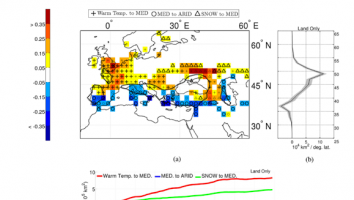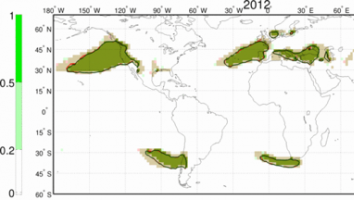Aim: Understanding the processes and feedbacks leading to the amplification of climate changes and of their impacts in so-called hotspot areas (polar regions, mountain areas, the Mediterranean basin, and urban environments) and study of climate predictability in these areas. We use an approach that integrates in-situ observations and observation-based gridded datasets, reanalysis data and high-resolution climate models; we perform sensitivity experiments with global climate models; we develop, use and refine dynamical downscaling and stochastic downscaling techniques for precipitation to be applied in orographically-complex regions.
Research topics:
- Elevation-dependent warming and elevation-dependent change in other climate variables and extremes
- Changes in high-altitude hydrological cycle (precipitation and snow) and involved driving mechanisms (feedbacks, local and long-range circulation, teleconnections)
- Research in polar areas and arctic amplification (e.g. coupling of the different components of climate system and physical-chemical processes at the air-sea-ice and air-snow-land interface and in the troposphere; study of processes in polar stratosphere using passive/active ground-based remote sensing used to tune model parameterization schemes; characterization of PBL in polar regions; transport processes, energy balance, polar ecosystems)
- Seasonal and decadal predictions in the Mediterranean
- Comparison, test, process-oriented evaluation and validation of meteorological and climate models
- Stochastic precipitation downscaling with RainFARM
- Turbulent and dispersive dynamics of the atmospheric boundary layer for the evaluation of its influence on meteorology and climate in different hotspot areas (polar areas, urban areas, Mediterranean)

The probability of summer-dry Mediterranean climate is projected to expand northward and eastward over European domain (including France, southern UK and Benelux) based on CMIP5 scenario simulations (Alessandri et al., 2014; see figure 2 also reproduced below). Therefore it is expected for dry summers as 2018 to become more frequent in the coming decades, which could affect living conditions in some of the most densely populated regions in the world.
Reference
Alessandri, A., De Felice, M., Zeng, N. et al. Robust assessment of the expansion and retreat of Mediterranean climate in the 21st century. Nature Sci Rep 4, 7211 (2015) doi:10.1038/srep07211

Progetti rilevanti:
NextDATA, ECOPOTENTIAL, ERA4CS MEDSCOPE, LISTEN, HyMeX, S2S, Life ASTI, GEO-GNOME, RainCast, TEAMx


